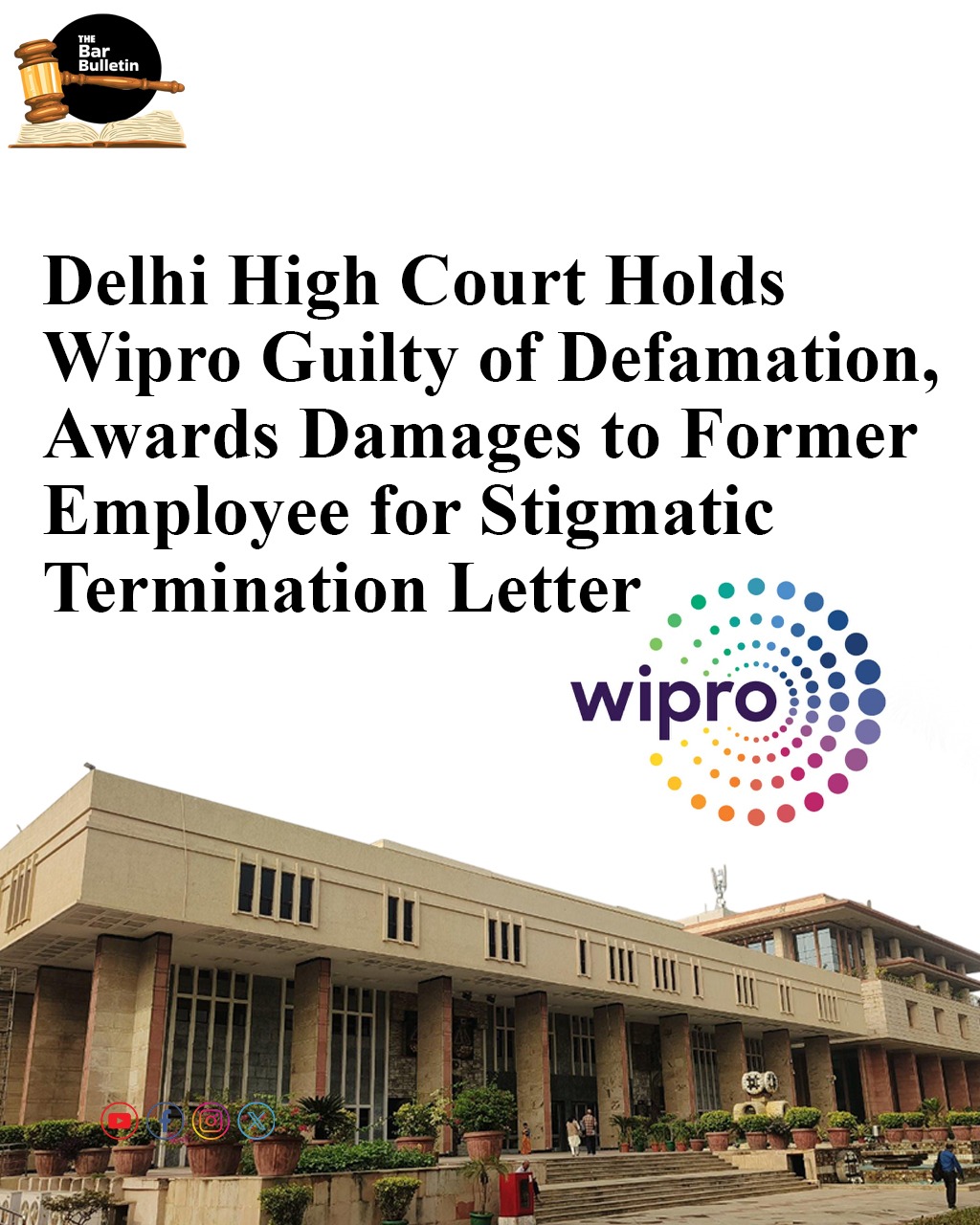The Delhi High Court held Wipro Limited liable for defamation against its former employee for issuing a stigmatic termination letter containing unsubstantiated remarks such as “malicious conduct” and “loss of trust.” The Court, presided over by Justice Purushaindra Kumar Kaurav, awarded damages to the plaintiff and directed Wipro to issue a fresh discharge letter expunging the defamatory remarks.
At the same time, the Single Judge Bench of Justice Purushaindra Kumar Kaurav observed that every individual is vested with an intrinsic right to reputation, which has been recognised as an integral facet of the right to life under Article 21 of the Constitution, and any act that infringes this right is often termed as defamatory. Pointing out that the allegations in the termination letter, which suggest malicious conduct or poor performance, are in direct conflict with the documented track record of the professional conduct of the plaintiff, the Bench said that the terms used in the termination letter, without any material basis, have the effect of clouding the professional commitment, and are demonstrably false and defamatory.
The Bench, however, cautioned that the mere act of providing a rationale, in exercise of discretion, does not transform the nature of the termination or invite a higher standard of scrutiny. Even if some reasons are assigned by the employer, it would not mean that the mere act of assigning reasons would render an employer susceptible to a heightened judicial scrutiny of termination, akin to the judicial review of termination in the realm of public law.
While recognizing that any equitable relief is incompatible with the principles of contractual autonomy and the intrinsically esoteric character of the employment relationship, the Court opined that in the domain of private employment governed exclusively by a contract, the consequence of wrongful termination is determined by the character of the agreement itself. Such agreements, founded on mutual volition, fall outside the scope of judicial enforcement. Consequently, even if the termination is alleged to be arbitrary, mala fide, or procedurally flawed, the remedy in such cases remains confined to monetary compensation.
While interpreting the doctrine of “compelled self-publication” in matters of defamation, the Court opined that emanating from the bedrock of the foreseeability principle, this doctrine holds that any originator whose conduct predictably forces another to disclose defamatory matter must answer for its spread. Accordingly, an employer who, by internal mandate or statutory compulsion, obliges a former employee to reveal the reason for termination cannot exonerate itself from liability for every foreseeable instance of that compelled disclosure and the reputational injury it occasions.
Furthermore, the Court noted that the liability for publication in civil defamation cases does not depend only upon the presence of malice or intent to harm; rather, it is premised on the role of the originator in triggering a foreseeable chain of events that results in the dissemination of defamatory material. As such, the tort of defamation is akin to other civil wrongs predicated upon causative responsibility. It is enough to establish that an act or omission caused the defamatory statement to be read by someone other than the plaintiff, either due to compulsive self-disclosure of the defamed person or foreseeable disclosure.
The dispute arose in this case on the issuance of a termination/relieving letter received by the plaintiff, attributing his conduct as “malicious” and stating that his actions had resulted in an irreparable breakdown in the employer-employee relationship. The plaintiff approached the High Court seeking the issuance of a fresh termination letter expunging the observations impugning his character and professional integrity. On being summoned, the defendant justified the termination letter as being in strict conformity with the procedure stipulated under the employment contract, as, according to them, the remarks were merely reflective of his conduct during the tenure of his employment and were necessitated by the circumstances culminating in his termination.
The High Court, however, cautioned that the employers cannot evade the liability under defamation law by using confidential correspondence as a shield when, in substance, their actions set in motion the very harm the law seeks to redress. Therefore, while expunging defamatory remarks made against the character of the employee, working with Wipro Limited, from his termination letter, the Court awarded Rs. 2 lacs compensatory damages in favour of the employee to redress the reputational harm, emotional hardship, and loss of his professional credibility.
Appearances:
Advocate Abhijit Mishra, for the Plaintiff
Advocates Mandeep Singh Vinaik, Ragini Vinaik, and Gaikhuanlung, for the Defendant
![]()



